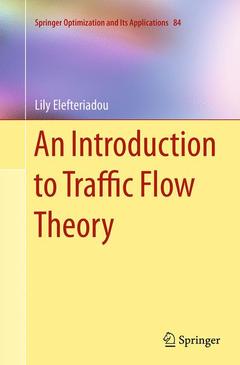Description
An Introduction to Traffic Flow Theory, 2014
Springer Optimization and Its Applications Series, Vol. 84
Author: Elefteriadou Lily
Language: English
Subject for An Introduction to Traffic Flow Theory:
Approximative price 60.12 €
In Print (Delivery period: 15 days).
Add to cartSupport: Print on demand
Description
/li>Contents
/li>Biography
/li>Comment
/li>
This text provides a comprehensive and concise treatment of the topic of traffic flow theory and includes several topics relevant to today?s highway transportation system. It provides the fundamental principles of traffic flow theory as well as applications of those principles for evaluating specific types of facilities (freeways, intersections, etc.). Newer concepts of Intelligent transportation systems (ITS) and their potential impact on traffic flow are discussed. State-of-the-art in traffic flow research and microscopic traffic analysis and traffic simulation have significantly advanced and are also discussed in this text. Real world examples and useful problem sets complement each chapter.
This textbook is meant for use in advanced undergraduate/graduate level courses in traffic flow theory with prerequisites including two semesters of calculus, statistics, and an introductory course in transportation. The text would also be of interest to transportation professionals as a refresher in traffic flow theory, or as a reference. Students and engineers of diverse backgrounds will find this text accessible and applicable to today?s traffic issues.
Introduction.- Part 1.- 1. Modeling the Motion of a Single Vehicle.- 2. Modeling Vehicle Interactions and the Movement of Groups of Vehicles.- Part 2.- 3. The Traffic Stream: Traffic Flow Performance Characteristics.- 4. Capacity.- 5. Traffic Operational Performance Measures.- Part 3.- 6. Analytical Models for Bottleneck and Queuing Evaluations.- 7. Simulation Modeling.- Part 4.- 8. Freeways.- 9. Signalized Intersections and Networks.- 10. Unsignalized Intersections.- 11. Two-Lane Highways.- Appendix A.- Appendix B.- Index.
First textbook to address the modern advances in traffic flow theory in 20 years
Contains real-world examples and a problem set in each chapter
Discusses topics such as microscopic traffic analysis and traffic simulation and includes research related to traffic flow
Includes supplementary material: sn.pub/extras
These books may interest you

Traffic Engineering Handbook 147.98 €



